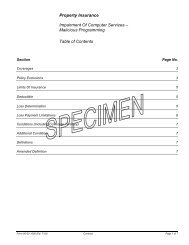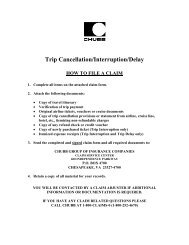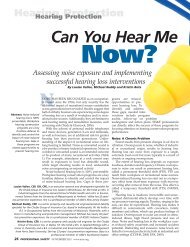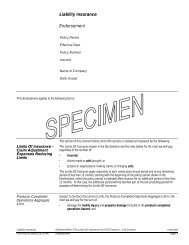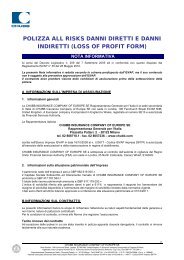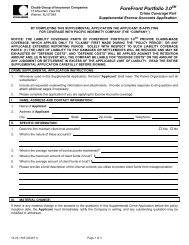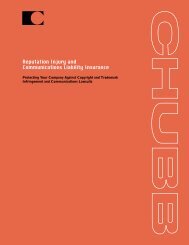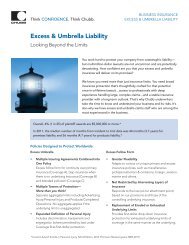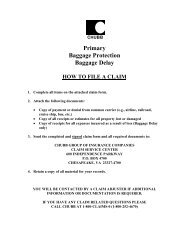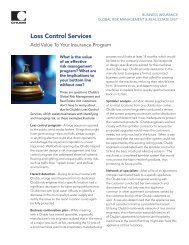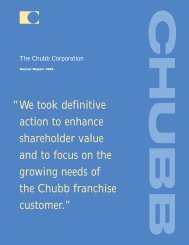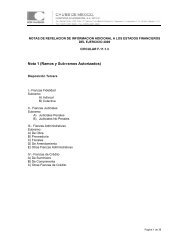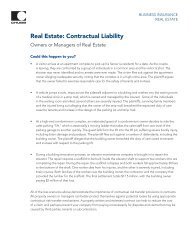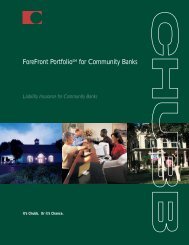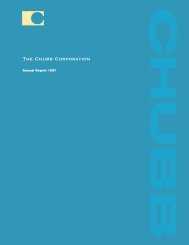Annual Report 2001 - Chubb Group of Insurance Companies
Annual Report 2001 - Chubb Group of Insurance Companies
Annual Report 2001 - Chubb Group of Insurance Companies
You also want an ePaper? Increase the reach of your titles
YUMPU automatically turns print PDFs into web optimized ePapers that Google loves.
(j) Stock-Based Compensation<br />
The intrinsic value method <strong>of</strong> accounting is used for<br />
stock-based compensation plans. Under the intrinsic<br />
value method, compensation cost is measured as the<br />
excess, if any, <strong>of</strong> the quoted market price <strong>of</strong> the stock at<br />
the measurement date over the amount an employee<br />
must pay to acquire the stock.<br />
(k) Income Taxes<br />
The Corporation and its domestic subsidiaries Ñle a<br />
consolidated federal income tax return.<br />
Deferred income tax assets and liabilities are recognized<br />
for the expected future tax eÅects attributable to<br />
temporary diÅerences between the Ñnancial reporting<br />
and tax bases <strong>of</strong> assets and liabilities, based on enacted tax<br />
rates and other provisions <strong>of</strong> tax law. The eÅect <strong>of</strong> a<br />
change in tax laws or rates is recognized in net income in<br />
the period in which such change is enacted.<br />
U.S. federal income taxes are accrued on undistributed<br />
earnings <strong>of</strong> foreign subsidiaries.<br />
(l) Foreign Exchange<br />
Assets and liabilities relating to foreign operations are<br />
translated into U.S. dollars using current exchange rates;<br />
revenues and expenses are translated into U.S. dollars<br />
using the average exchange rates for each year.<br />
The functional currency <strong>of</strong> foreign operations is gener-<br />
ally the currency <strong>of</strong> the local operating environment<br />
since their business is primarily transacted in such local<br />
currency. Translation gains and losses, net <strong>of</strong> applicable<br />
income tax, are excluded from net income and are<br />
credited or charged directly to a separate component <strong>of</strong><br />
comprehensive income.<br />
(m) Cash Flow Information<br />
In the statement <strong>of</strong> cash Öows, short term investments<br />
are not considered to be cash equivalents. The eÅect <strong>of</strong><br />
changes in foreign exchange rates on cash balances was<br />
immaterial.<br />
In 1999, the Corporation acquired all <strong>of</strong> the outstanding<br />
common shares <strong>of</strong> Executive Risk Inc. in exchange<br />
for common stock <strong>of</strong> the Corporation (see<br />
Note (3)(a)). The details <strong>of</strong> the acquisition were as<br />
follows: fair value <strong>of</strong> assets acquired, including goodwill,<br />
$2,459 million; fair value <strong>of</strong> liabilities assumed, $1,627<br />
million; and fair value <strong>of</strong> common stock issued and<br />
options assumed, $832 million. This noncash transaction<br />
has been excluded from the consolidated statements <strong>of</strong><br />
cash Öows.<br />
(n) Accounting Pronouncements Not Yet Adopted<br />
In June <strong>2001</strong>, the Financial Accounting Standards<br />
Board issued Statement <strong>of</strong> Financial Accounting Stan-<br />
dards (SFAS) No. 142, Goodwill and Other Intangible<br />
Assets. The Statement addresses how intangible assets<br />
should be accounted for upon their acquisition and how<br />
goodwill and other intangible assets should be accounted<br />
for after they have been initially recognized in the Ñnan-<br />
cial statements. Under SFAS No. 142, goodwill will no<br />
longer be amortized but rather will be tested at least<br />
annually for impairment. The provisions <strong>of</strong><br />
SFAS No. 142 are eÅective for the Corporation for the<br />
year beginning January 1, 2002. The Statement shall be<br />
applied to goodwill recognized in the Corporation's Ñ-<br />
nancial statements at that date. SFAS No. 142 may not<br />
be applied retroactively to Ñnancial statements <strong>of</strong> prior<br />
periods. The elimination <strong>of</strong> goodwill amortization is<br />
expected to result in an increase in net income in 2002 <strong>of</strong><br />
approximately $20 million. The Corporation is in the<br />
process <strong>of</strong> assessing the eÅect, if any, that the implemen-<br />
tation <strong>of</strong> the other provisions <strong>of</strong> SFAS No. 142 will have<br />
on its Ñnancial position or results <strong>of</strong> operations.<br />
(2) Adoption <strong>of</strong> New Accounting Pronouncements<br />
EÅective January 1, <strong>2001</strong>, the Corporation adopted<br />
SFAS No. 133, Accounting for Derivative Instruments<br />
and Hedging Activities, and SFAS No. 138, Accounting<br />
for Certain Derivative Instruments and Certain Hedging<br />
Activities. SFAS No. 133 establishes accounting and<br />
reporting standards for derivative instruments and hedg-<br />
ing activities and SFAS No. 138 provides additional<br />
guidance related to accounting and reporting for certain<br />
derivative instruments and hedging activities.<br />
SFAS No. 133 requires that all derivatives be recognized<br />
in the balance sheet as assets or liabilities and be mea-<br />
sured at fair value. Changes in the fair value <strong>of</strong> a<br />
derivative are reported in net income or other compre-<br />
hensive income, depending on the intended use <strong>of</strong> the<br />
derivative and whether it qualiÑes for hedge accounting.<br />
The Statements may not be applied retroactively to<br />
Ñnancial statements <strong>of</strong> prior periods. The Corporation's<br />
use <strong>of</strong> derivatives has not been signiÑcant. Thus, the<br />
adoption <strong>of</strong> SFAS No. 133 and SFAS No. 138 did not<br />
have a signiÑcant eÅect on the Corporation's Ñnancial<br />
position or results <strong>of</strong> operations.<br />
EÅective April 1, <strong>2001</strong>, the Corporation adopted the<br />
Emerging Issues Task Force (EITF) consensus on Issue<br />
No. 99-20, Recognition <strong>of</strong> Interest Income and Impair-<br />
ment on Purchased and Retained BeneÑcial Interests in<br />
Securitized Financial Assets. EITF Issue No. 99-20<br />
requires that investors in certain asset-backed securities<br />
recognize changes in a security's estimated yield prospec-<br />
tively. EITF Issue No. 99-20 also requires that if the<br />
carrying value <strong>of</strong> any such asset-backed security exceeds<br />
its current fair value, a determination should be made as<br />
to whether the excess represents an other than temporary<br />
decline in value and any such decline should be<br />
recognized as a loss in the income statement. The adoption<br />
<strong>of</strong> EITF Issue No. 99-20 did not have a signiÑcant<br />
eÅect on the Corporation's Ñnancial position or results <strong>of</strong><br />
operations.<br />
54



